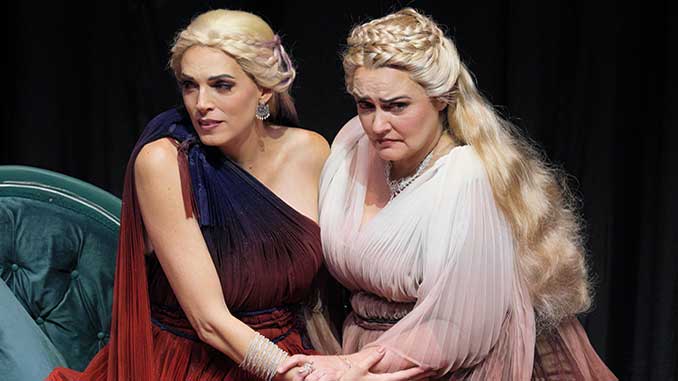 It was something of a minor miracle that the opening night of National Opera’s ambitious production of George Frideric Handel’s 1735 masterpiece, Alcina, turned out to be the triumph that it was, given the many setbacks overcome, including the sudden loss of the advertised conductor during rehearsals, and a principal singer having to withdraw due to Covid.
It was something of a minor miracle that the opening night of National Opera’s ambitious production of George Frideric Handel’s 1735 masterpiece, Alcina, turned out to be the triumph that it was, given the many setbacks overcome, including the sudden loss of the advertised conductor during rehearsals, and a principal singer having to withdraw due to Covid.
Like many operas of the period, Alcina has a long, complicated, inconsequential plot involving magic spells, animal transformations, love, deception and redemption, but in this case interwoven with a succession of beautiful arias, written to be staged at the time in a series of lavish tableau.
Working with a limited budget, director Peter Coleman-Wright wisely decided to prioritise the music over lavish presentation, gathering together a cast of some of Australia’s finest exponents of the music of Handel, to be accompanied by the Canberra Symphony Orchestra.
He sought out a clever young emerging designer to design a stripped back production to enhance the limited theatrical facilities available in Llewellyn Hall and provided the opportunity for local singers and dancers to experience working at a professional level.
It was after her performances in Alcina in La Fenice in Venice that Dame Joan Sutherland was given the title of ‘La Stupenda’. These performances of Alcina were dedicated to Dame Joan Sutherland and Richard Bonynge, and a small exhibition, featuring some gowns worn by Dame Joan, together with photographs of her in the costumes and makeup she wore in the Robert Helpmann production for the Australian Opera, was set up in the Llewellyn Hall foyer.
To add to the sense of occasion Richard Bonynge had accepted National Opera’s invitation to attend the opening night performance.
The roles of Alcina and her wayward sister, Morgana, were performed by Emma Matthews and Rachelle Durkin. This was quite a coup for National Opera because neither singer has been seen in opera on this side of Australia for some time.
Emma Matthews is currently head of Classical Voice and Opera Studies at the West Australian Academy of Performing Arts, while Rachelle Durkin has recently returned to Australia after establishing a major international career performing throughout North America, Europe and Australasia.
In superb voice, Matthews brought an imperious presence to her role, acting with confidence and commanding the stage on every appearance. Her renditions of Alcina’s complicated arias where spellbinding in their virtuosity and authority.
Similarly, Rachelle Durkin also sang superbly, especially the showpiece aria, Tonami a Vagheggiar, injecting a winning playfulness into her interpretation of Morgana’s tempestuous nature.
Counter tenor, Russell Harcourt, thrilled with his beautiful rich vocal tone and thoughtful characterisation as Ruggiero, the reluctant object of Alcina’s affection, and although saddled with an unfortunate costume, John Longmuir impressed with his rich tenor voice and strong presence as Oronte, the mischief-making lover of Morgana. Also not faring much better in the costume department, Judd Arthur, with his commanding bass-baritone voice brought added gravitas to his role as Melisso.
Local soprano, Katrina Wiseman, sparkled with her confident singing as the young boy Oberto, especially in her scene when she defies Alina’s command to kill a lion, which turns out to be her father. Standing in for the Covid-stricken Sally-Anne Russell, and singing side-stage while Zsuzsi Sobosia walked the role of Bradamante, Cassandra Seidemann revealed a lovely warm soprano voice.
Though they had little to do, the ensemble achieved a rich vibrant sound, and the six dancers added a welcome visual element to the production.
Monique Langford’s elegant stage design of soaring draperies and tasteful multi-level rostra provided an elegant setting for the action. But although her costumes for Alcina and Morgana were quite lovely and her choice of neutral toned costumes for the ensemble and dancers worked well, her costumes for the male principals were unflattering to the point of distraction, but might have been improved had they been ironed.
Stepping in at short notice, Luke Spicer conducted with confidence and flair, taking advantage of the superb acoustics of Llewellyn Hall to achieve an excellent balance between orchestra and singers.
So, despite the setbacks, the jittery stage management and first night nerves preventing the perfect performance everyone was aiming for, National Opera’s production of Alcina was still a major triumph for the company and all concerned, for providing an evening of superb singing of a quality rarely achieved, and one which will be cherished by those lucky enough to have experienced it.
Alcina
Llewellyn Hall – ANU School of Music, William Herbert Place, Canberra
Performance: Thursday 8 December 2022
Season: 8 & 10 December 2022
Information: www.nationalopera.org.au
Image: Rachelle Durkin and Emma Matthews – photo by Peter Hislop
Review: Bill Stephens OAM
